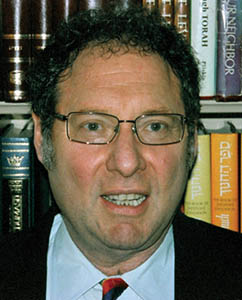
Rabbi Shimon ben Gamliel said in the name of Rabbi Yehoshua: “From the day God destroyed the Holy Temple, there is no day without curse, the dewfall is not blessed and the delicious taste has been removed from crops.” Rava said: “Each new day the curse is greater than that of the day before… In what merit, then, does the world survive? Because of the Kedusha D’Sidra (the recitation of the angels’ declaration, ‘Kadosh, Kadosh, Kadosh—Holy, Holy, Holy is the Lord of Hosts, the world is filled with His glory,’ in the Uva L’Tzion prayer; and because of the congregation responding, ‘Amen, Yehei Shmei Raba,’ ‘May His Great Name be blessed,’ when the mourner recites Kaddish.” (Sotah 48A, 49A)
I remember the first day I walked into the shul of the Nitra Chasidim in Monsey. There it was, posted on the front door, in Yiddish: “Gedenk! Alleh toieren foon Himmel vellen ge’efent veren.” “Amen, Yehei Shmei Raba.” Nisht fahrgessen!! Tot shvere g’zeiros tzurisin.” Finally finding an English-speaking Chasid, I was given the translation: “Remember! All the gates of Heaven will be opened [when you respond] ‘Amen, Yehei Shmei Raba…’ Do not forget! And all evil decrees will be torn up!” I was taken aback. I never heard anything like that before. During davening, when mourners recited Kaddish, there was absolute silence, and then a hundred men loudly responded, “Amen, Yehei Shmei Raba…” with sincere belief that God was great.
Let us attempt to understand the secret of this seven-word, 28-letter proclamation and the Kaddish that is built around it. What is there about a recitation of “Amen, Yehei Shmei Raba…” with all one’s strength that can cause the gates of Heaven to open wide and annul evil decrees of suffering? What is the common denominator of “Amen, Yehei Shmei Raba…” and our saying “Kadosh, Kadosh, Kadosh…”—“Holy, Holy, Holy is the Lord of Hosts….” that is potent enough to guarantee the continued existence of the universe?
Originally, the Beit Hamikdash was supposed to be the center of God’s Presence in this world. Through the worship of God in the Holy Temple in Yerushalayim, Israel would build a holy, just and moral society based on Torah; and mankind was supposed to be influenced and the spread of ethical monotheism would be attained. The Holy Temple is gone, but Israel’s public acknowledgement of God’s greatness remains—so creation survives.
Both the Kaddish and the Uva L’Tzion prayer are written in Aramaic, the language of the masses in ancient Babylonia. We say “Kadosh, Kadosh, Kadosh,” “Holy, Holy, Holy is the Lord of Hosts,” in the Uva L’Tzion, which is recited at the end of prayers, as men are soon going into the workplace where they take the idea of God’s holiness with them in order to spread Godliness. By exalting God in Aramaic we bring God into the darkest corners of the world, influencing and spreading the idea of God.
Even with the destruction of the Beit Hamikdash, God’s sustenance did not cease; were that ever to happen, the universe could no longer exist. There is still a flow of spiritual nourishment, but now it comes through Israel, and because of the holiness created by its individual members. Kaddish is a public declaration of faith in Israel’s national purpose, of confidence in the ultimate triumph of the acceptance of the Kingdom of God, by all mankind. Similarly, in the Uva L’Tzion prayer, we take the declaration of the angels, “Kadosh, Kadosh, Kadosh,” and make it our own.
The mourner stands amid his peers and announces, “Yitgadal v’yitkadash…”—“May His Great Name grow exalted and be sanctified,” and the congregation responds, “Amen, Yehei Shmei Raba m’vorach l’olam ul’olmei olmaya”—“Amen, May His Great Name be blessed for ever and ever,” they are agreeing to the mourner’s acknowledgement of God’s greatness, thus increasing the glorification of God in the world.
So I ask: Why is there so much talking in shul, sometimes even laughing, when mourners recite the Kaddish, grieving, with broken hearts?
By Martin Polack
Martin Polack is a business analyst and involved in adult Jewish education.








